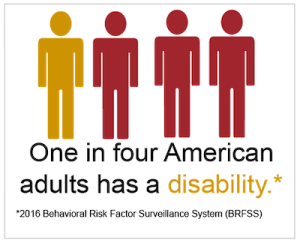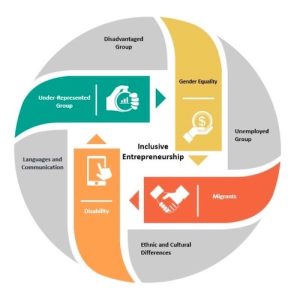Startup Business With Disability Entrepreneurship is Inclusive
Startup Business With Disability: There are already more than 1.8 million business owners with disabilities in the US (American Community Survey by US Census Bureau—ACS). Those 1.8 million businesses have revenues of $1.26bn according to the National Disability Institute—NDI).
(American Community Survey by US Census Bureau—ACS). Those 1.8 million businesses have revenues of $1.26bn according to the National Disability Institute—NDI).
Up to 1 in 4 (27 percent) adults in the United States have some type of disability (Centers for Disease Control and Prevention—CDC). That implies that there is a vast potential for entrepreneurship among people with disabilities. It is estimated that there are more than one billion disabled people in the world.
The UN Convention on the Rights of Persons with Disabilities was published in 2006 (not yet ratified by US). It has the purpose to promote, protect and ensure the full and equal enjoyment of all human rights and fundamental freedoms by all persons with disabilities, and to promote respect for their inherent dignity. It also states that “Persons with disabilities include those who have long-term physical, mental, intellectual or sensory impairments which in interaction with various barriers may hinder their full and effective participation in society on an equal basis with others.”
Disability Inclusion

Since one in four American adults has a disability, it is very important that in all but the most debilitating cases, they should be included in the economy.
A natural consequence is that people with a disability, who have the inclination to pursue an entrepreneurial career should be supported and encouraged, probably with more vigor than is provided for nondisabled people. Data from the US Census Bureau shows a record-breaking 5,481,437 new businesses were started in 2023. Proportionately therefore it would not be stretching the point to suggest that more than a million businesses could be started by people with a disability annually.
In any event, we should see many more startups by people with a disability each year than is currently the case. Their economic contribution would be huge, quite apart from both the savings which would result, as well as the sense of fulfillment it would offer the entrepreneurs themselves.
However, people with disabilities intending to start a business often must overcome unique barriers to entrepreneurship as they strive to compete alongside their nondisabled counterparts. The NDI found that successful entrepreneurs with disabilities must overcome subtle and not-so-subtle attitudinal, technical and policy challenges. Frequently, the business world does not fully recognize their abilities and resilience. Those with visual, hearing, cognitive and ambulatory disabilities are the most likely to have the possibility of creating startups. Business Disability International, a UK-based organization published Learning Directly from Disabled People: a toolkit for global business. The report is aimed at business and is one of many ways that corporations are themselves changing both attitudes and behavior.

Source: NDI
Employed people with a disability are more likely to be self-employed than those with no disability. In 2021, about 60 percent of people with disability were outside the labor force. Self-employment rates are higher among workers with limitations compared with workers without limitations, according to the Journal of Disability Policy Studies.
However, the employment of disabled people is on the increase. Disability-owned businesses are a growing segment of small businesses. In 2022, the employment-population ratio—that is, the percentage of the population that is employed—for those with disability increased by 2.2 percent from the prior year to 21.3 percent in 2022 (Bureau of Labor Statistics).
The one in four adults, or about one a quarter million people, with physical or cognitive impairment or disability (visible or invisible) have special advantages available to create their own new venture and flourish. The opposite is generally considered to be the case.
People with disability tend to have greater difficulty than average to find transportation, loans, equity, and suitable office accommodation. They also face inadequacies and cost of assistive technology. Median income of people without disabilities was $30,469, compared to $20,250 for individuals with disabilities.
Entrepreneurship by People with Disability Is Inclusive
There are several significant disadvantaged groups of people in society who face very specific hurdles to business startup. Those hurdles have been significantly lowered for particular groups. For those with disability, there are many factors that can make entrepreneurship enabling.
Including disadvantaged groups into the world of entrepreneurship brings advantages to them directly, but the benefit is for society as a whole. This is a main reason why startup business with disability has become so significant.
Many reasons exist for why entrepreneurship is inclusive for people with disabilities, including: circumstance, personality, networks, support programs, changing public attitudes and progressive public policies.
Clearly entrepreneurship is not for everyone, and the same is also true among people with disabilities. However, if people with disabilities choose an entrepreneurial route in life, they will experience positive benefits of greater inclusion, rather than isolation.
There are already barriers to entrepreneurship to many people in society. Those barriers may be a consequence of gender, race or other personal characteristics. Such disadvantages apply to people with a disability in addition to their physical or cognitive ones.
Growth in Startup with Disability
There are many of the reasons why startup with disability is a growing part of entrepreneurship:
- People with disability have innate or developed ability to confront challenge and road blocks;
- They are likely to have physical or cognitive characteristics preventing many employed jobs;
- Labor market prejudice propels disadvantaged people towards self-employment;
- People with disability are compelled to think how they can overcome barriers to employment;
- Since 12.7 percent of employees now work from home and 28.2 percent work a hybrid model (WFH Research), it makes it easier for people with disability to do the same;
- There is much helpful advice on making a home office suitable for people with disabilities;
- Special help is available from State Vocational Rehabilitation Agencies;
- Equity and loan crowdfunding is very suited to people with special needs;
- Mentoring is offered by government and agencies, such as the Nasdaq Entrepreneurial Center;
- US Government’s $50 billion annual procurement has 12% target for small disadvantaged businesses;
- Positive business attitudes to impairments: autism and other neurodivergent people1;
- SBA 8(a) business development program & loans for Disability-Owned Business Enterprises2;
- The Office of Disabled Employment Policy (ODEP) develops and influences policies/practices to increase the number and quality of employment opportunities for people with disabilities;
- The work of Disability.IN, whose vision is of an inclusive global economy where people with disabilities participate fully and meaningfully. Their network of over 500 corporations expands opportunities for people with disabilities across enterprises.
- The Disability Opportunity Fund (a CDFI) and other disability focused funders facilitate startups by people with disability;
- NDI/SBA Small Business Hub supports entrepreneurs/small business owners with disabilities;
- SBA microloans are beneficial for startup with disability (average microloan is $13,000);
- Other Federal Departments/Agencies, eg USDA (rural development) and RSA (Rehabilitation Services Administration) provide opportunities;
- Not only the US Government and agencies take positive steps for people with disabilities aspiring to startup, but so do administrations in other countries and international bodies, such as UNESCO;
- Able Accounts are tax-advantaged savings accounts for individuals with disabilities and their families3;
- 2Gether-International4 advises/trains aspiring disabled entrepreneurs and connects them with possible investors/clients; has a startup accelerator for disabled founders; runs Venture Labs, a 4-week online program for disabled founders in early stages of their startup journey;
- Respectability.org has a Disability Entrepreneurship Toolkit that describes many resources;
- Financial institutions with strong social values, such as Community Development Financial Institutions5, are open to working with DOBEs—Disability-Owned Business Enterprises;
- The Disability Opportunity Fund, a CDFI, provides financial products, technical assistance, equity investment and financial advisory services to improve quality of life and build personal wealth for people with disabilities; their Disability Angel Fund invests in early and growth stage companies which provide innovative market solutions, products, and services for people with disabilities;
- The US Disability Chamber of Commerce promotes small businesses dedicated towards disability, diversity, inclusion and innovation, specifically focused towards DOBEs, certified disability-owned business enterprises (V-DOBEs), Veteran disability-owned business enterprises (SDV-DOBEs), Service-disabled veteran-owned business enterprises (SDV-DOBEs) and Inclusive organizations/companies;
- The Community Development Finance Institutions Fund serves mission-driven financial institutions that take a market-based approach to supporting economically disadvantaged communities;
- Ability Magazine champions the Americans with Disabilities Act and actively seeks advancement opportunities for people with disabilities; it also owns Ability Jobs, the largest jobs site for people with disabilities;
- Many organizations and nonprofits are working in favor of the improvement of employment opportunities for people with disabilities, including, for example the American Association of People with Disabilities (AAPD), that is disability-led and has the purpose to increase the political and economic power of people with disabilities. The AAPD’s Start Access Program focuses on entrepreneurship.
Small Business Ownership by People with Disabilities—Challenges and Opportunities, a research-based report by the National Disabilities Institute provides a very good overview and understanding of the situation. Published in 2022, it remains a good reference.
Change in Attitudes Towards and Legislation for Disabled People at Work
The 30 year-old legislation (Americans with Disabilities Act—ADA) prohibits discrimination against people with disabilities in everyday activities. Since the ADA was passed and implemented, general attitudes have become significantly less prejudicial to people with disabilities.
Title 1 of the Act is concerned with Equal Employment Opportunity for Individuals with Disabilities. Intentional or unintentional employer prejudice (ableism) towards disabled people tends to propel many towards self-employment or business creation, in addition to their experience, knowledge, self-esteem or self-limitation.
At work, the ADA applies to businesses employing more than 15 people. For those who wish to want to understand the advances in attitudes towards and progress of people with disabilities, an important book is Disability Pride: Dispatches From a Post-ADA World (ISBN 9780807013335). The author and journalist, Ben Mattlin, is himself a lifelong wheelchair user.
While physical and access impediments are easy to observe, preferential advancement for able people is sometimes difficult to prove, especially as it concerns cognitive or invisible disability. Some disabilities covered under the ADA may not immediately come to mind. For example, they can include major depressive disorder, diabetes, PTSD, learning disabilities, anxiety, migraine headaches, or gastrointestinal disorders.
Entrepreneurs with disabilities expressed that they started their business to have a more flexible work schedule because they had experienced a hostile work environment or a lack of advancement opportunity or they were laid off and could not find a job in their field. (Small Business Ownership by People with Disabilities, 2022).
Assistive Technology: Business Recognizes Opportunities
The subject of disability is widely acknowledged. Many companies, including startups, have entered the market for assistive technologies. Their products help maintain or improve an individual’s functioning related to cognition, communication, hearing, mobility, self-care and vision, thus enabling their health, well-being, inclusion and participation.
Each year several Abilities Expos, organized by Abilities.com that showcase products. In 2024 there were seven expos in major cities. Accessibility.com publishes a digital accessibility vendor directory to identify companies serving the accessibility market.
Knowbility, a nonprofit organization in Austin, Texas is a leader in accessible information technology. Its mission is to create an inclusive digital world for people with disabilities. Knowbility organizes AccessU, the annual conference where tech professionals, content creators, policymakers, and advocates come together for deep learning in accessible digital design.
The assistive technology market is very lively. The World Health Organization describes assistive technology as “an umbrella term for products and services that help people with different needs such as cognition, communication, hearing, mobility, self-care and vision”. The Assistive Technology Industry Association lists about 60 partners among organizations in the industry that provide products and services that enhance benefits and opportunities for persons with disabilities.
There is a company called Remarkable, originated by the Cerebral Palsy Association. It offers a suite of programs that support Disability Tech entrepreneurs throughout their startup journey, from the concept to scaling their product. Their US AssistiveTech Accelerator program includes $55K seed funding. They also offer opportunities to apply for Seed to Series A funding.
There are a range of nonprofits that also contribute, from different perspectives of disadvantage. For example, in New Hampshire, there are those that support women and people of color in the business field—the NH Center for Women & Enterprise and the Business Alliance for People of Color.
Many web-tech companies have been started to help web developers with accessibility (as covered by ADA Guidance on Web Accessibility and the Web Content Accessibility Guidelines (WCAG) from the World Wide Web Consortium. There are dozens of website accessibility consultants in the US.
In finance, Enable Ventures invests in and scales early-stage companies that leverage disability as an asset and unleash untapped economic potential through products and services powered by universal design.
The World Health Organization estimates that by 2030, over two billion people will need at least one assistive product but that only 1 in 10 people in need have access to assistive technology today. For many outside of the US, high costs, inadequate infrastructure, and a lack of formal policies that mandate accommodations remain persistent obstacles to access.
There are many innovations in assistive technology being created all the time. An example is an  affordable new product, by Transcibe Glass. It is a gadget that clips to glasses and displays captions, as the wearer looks at a speaker—for deaf, hard of hearing, elderly, and other people who want to improve their comprehension of spoken communication using captions.
affordable new product, by Transcibe Glass. It is a gadget that clips to glasses and displays captions, as the wearer looks at a speaker—for deaf, hard of hearing, elderly, and other people who want to improve their comprehension of spoken communication using captions.
 Another amazing innovator is Standing Ovation is an Austrian firm that has created a standing and movement aid for everyone to take the strain off their legs. Chefs and kitchen staff work their whole shifts on their feet in confined spaces, thus making such a career really difficult for people with disability.
Another amazing innovator is Standing Ovation is an Austrian firm that has created a standing and movement aid for everyone to take the strain off their legs. Chefs and kitchen staff work their whole shifts on their feet in confined spaces, thus making such a career really difficult for people with disability.
If you put your mind to it, you’ll realize that across the US there are many thousands of indoor workers who may face a mobility problem at work. They include distribution employees, factory production workers, hotel staff, bakers, bartenders… and many more who often spend the majority of their work day on their feet, thus closing many careers to people who have a disability that means that cannot spend most of their day on their feet.
Naturally, their number will include many who make have an affected disability only on a temporary basis. Often sick pay does not cover extended recovery periods. Such people may include key workers or those holding essential roles. Secondary consequences are that both for those with a permanent, or a temporary disability, there may be severe personal or family economic hardship as a result—and severe operational difficulties for their employers.
For more help, you might want to visit Support for Entrepreneurs with Disability
Disclosures:
(a) I am a nondisabled person, but my 18 year-old granddaughter has Angelman Syndrome—a rare genetic disorder. Like others with total incapacity for independent living, she would never be a startup candidate.
(b) Venture Founders is dedicated to entrepreneurs who pursue their purpose with passion to start a venture committed to create shared value for all their stakeholders, with the aim of changing business for good—whether those founders are disabled or nondisabled.
(c) Venture Founders does not trade, and though my website, does not fall within the categories of organization covered by ADA or the WCAG 2.1 Guidelines, I do take steps progressively to improve its accessibility. I do my best to follow Best Practices Writing for the Accessible Web, offered by Digital.Gov.
Notes
1. Information technology is considered a natural area for people on the Autism Spectrum, but a recent article listed another 29 fields, mainly in services, where they’ll find a natural home. In the US today, services account for about 80 percent of jobs. Company programs include Dell Autism Hiring Program, FordWorks, HP Spectrum Success Program, Microsoft Neurodiversity Hiring Program.
2. Certified DOBEs must be 51 percent owned, operated and managed by a person with disability. Registration by Disability:IN.
3. Able Accounts come under the 2014 Able Act, and the Able National Resource Center has full information; accounts cover for example, education and could help to finance entrepreneurship education.
4. 2Gether-International operates entirely from grants, Participants pay no fees and receive $650 a month to seed their ventures. Founder Diego Mariscal considers that disabilities can be valuable assets to business performance, not hindrances. His website says, “From the moment disabled people wake up, they have to figure out how to get dressed, how to drive, how to communicate, how to live in a world that is not built to fit their needs.” The program is open to anyone who identifies as disabled and has a viable business goal.
5. Community Development Financial Institutions (CDFI list) finance under-served communities/businesses—CDFIs include banks, loan funds—most of which are nonprofit, credit unions & venture capital funds; other Credit Unions; Savings Banks; nonprofits, such as Accion and Grameen America.






